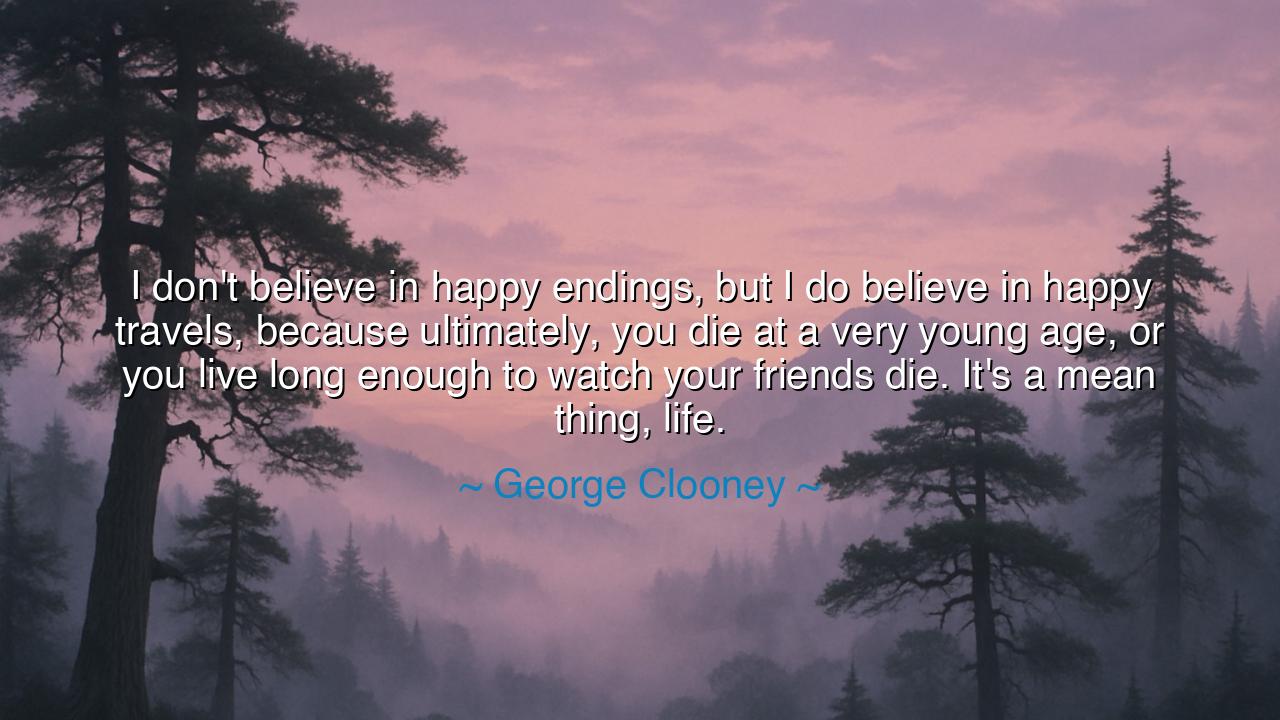
I don't believe in happy endings, but I do believe in happy
I don't believe in happy endings, but I do believe in happy travels, because ultimately, you die at a very young age, or you live long enough to watch your friends die. It's a mean thing, life.






"I don't believe in happy endings, but I do believe in happy travels, because ultimately, you die at a very young age, or you live long enough to watch your friends die. It's a mean thing, life." These words, spoken by George Clooney, carry the weight of profound wisdom, as though whispered by an elder who has weathered the storms of time. Clooney speaks not of the illusions of happy endings, but of the stark reality that lies at the heart of human existence. Life is fleeting—whether you die young or live to an age where the toll of loss is inevitable. The pursuit of happiness, then, lies not in some final, distant goal, but in the journey itself, in how we navigate the spaces between moments, how we choose to travel through the fleeting time we are granted.
Happy endings are a construct of the imagination, a comforting fantasy we cling to in the face of a world that often seems devoid of meaning. But Clooney’s wisdom reminds us that no matter how much we wish for a perfect conclusion, life remains untamed and unpredictable. Much like the ancient Greeks who spoke of the tragic hero, whose fate was sealed by forces beyond his control, Clooney paints a picture of life that is, in many ways, both harsh and inevitable. Endings—especially the happy ones—are not promised to us. Instead, we are left to find joy and meaning within the chaos, the impermanence, and the struggles that mark our journey.
There is a truth that Clooney speaks of, one that echoes through the lives of many great figures in history. Alexander the Great, for instance, built a vast empire that stretched across continents, yet he was still haunted by the knowledge that his reign would be cut short, that he would not live long enough to see the lasting peace or prosperity of his conquests. In the end, he too faced the truth that no matter how far we reach or how high we climb, the end is always near, and we must accept the inevitability of our fate. Similarly, Clooney’s words remind us that no matter the riches or accomplishments we gather in our lives, we must all eventually confront the reality of loss and mortality.
But Clooney’s perspective is not one of hopelessness; rather, it is one of acceptance. He calls us to embrace life for what it is: a journey full of joys and sorrows, of growth and decay. It is in this journey, this travel, that the true meaning of existence lies. To travel well, to live with purpose and with a sense of fulfillment, is to accept the ebb and flow of life. Like the ancient Romans who believed in the idea of virtus, a form of moral excellence achieved through perseverance, they did not seek out perfect endings. Instead, they sought to live honorably and with integrity through each phase of their lives.
Think of Mahatma Gandhi, whose life was defined by his constant journey toward truth and justice. His later years were marked by the immense pain of losing friends, allies, and supporters. But in his travels—both physical and spiritual—he found a measure of peace, not because he believed in a final, happy conclusion, but because he found purpose in the journey itself. Gandhi’s life was not about an ultimate destination but about walking with conviction, through triumph and defeat alike, through loss and sacrifice. And so it is with Clooney's reflection: it is not the end that matters, but how we live in the moments in between.
The lesson, then, is clear: life is not about striving for a perfect ending, for such a thing may never come. Instead, embrace the journey, with all its hardships and imperfections. Travel through life with awareness, with gratitude for each moment, for each person, for each step taken. Like the ancient sages who taught that life’s meaning is found in living fully and consciously, we must learn to find joy not in the pursuit of unattainable perfection, but in the act of living itself. And when loss inevitably comes, we must meet it with grace, knowing that the journey itself holds more meaning than any destination ever could.
Practical action for us today is simple yet profound: choose to live with purpose and awareness. Seek not perfect endings, but fulfillment in the small, meaningful acts of everyday life. Embrace your journey, no matter how uncertain or challenging it may be. And remember, as Clooney so wisely tells us, it is the travel—the journey itself—that carries the essence of life. So, travel well, fellow travelers, for in the end, it is not the destination, but how we journey through life that defines us.






AAdministratorAdministrator
Welcome, honored guests. Please leave a comment, we will respond soon